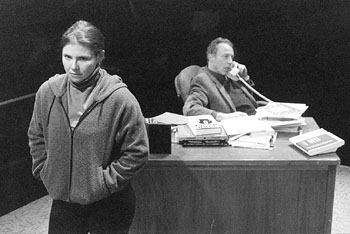![[Metroactive Stage]](/stage/gifs/stage468.gif)
[ Stage Index | Silicon Valley | Metroactive Home | Archives ]
Power Crisis
Professor and student vie for the upper hand in 'Oleanna'
By Heather Zimmerman
NOT UNLIKE the communication problem it turns upon, there are probably as many interpretations of Oleanna as there are words in the dictionary. Initially, City Lights Theater Company seems to have tackled David Mamet's intense two-person drama as a one-sided critique of political correctness, but as it unfolds, this production reveals itself as a brutal look at the politics of power--and what can happen when the power balance shifts.
A university student named Carol (Lauri Smith), struggling in a class, meets the professor in his office to discuss her grade. Distracted by phone calls, the professor, John (Fred Ochs), all but ignores his anxious student. Carol becomes openly desperate about passing the class; the professor, rather condescendingly, offers her friendly advice. But Carol perceives John's friendliness differently than he had intended and, by their next meeting, backed by an unidentified "group," she has filed a complaint accusing John of sexual harassment, a charge that threatens to derail his career and family life.
Director Hal Gelb deftly helms this volatile two-person dance around semantics and social philosophy. Whatever ideals for the greater good John and Carol each claim to defend, Gelb makes it obvious that it's really all a personal war for power between them, and accordingly, the tension never abates. Every word is a weapon, and even the right to speak is fiercely contested. Of course, when John and Carol do share their viewpoints, neither of them will listen to the other, interpreting each other's words to their own advantages.
Ochs portrays the professor as personable enough, if self-absorbed and self-satisfied. His bafflement at Carol's charges is completely genuine--Ochs ably shows us John's conviction that he's done nothing wrong. Smith does well grappling with the less-developed character of Carol, giving us a good sense of her paralyzing insecurity and later her giddiness with power. Although the professor seems an open book from the start, Mamet doles out insight into Carol too stingily. She's insecure and quite emotional but, beyond her hinting that she feels out of place at the university, why? As Carol becomes more articulate and self-assured throughout the play, her apparent misinterpretation of the professor's actions and words seem increasingly due to deliberate obtuseness. Mamet never supplies her with a motive beyond a vengeful grab for power.
Similarly, there's a whiff of randomness in Carol's accusation that, under the influence of her group, she might have singled out anyone to be her scapegoat for the white male establishment, just as she believes herself unfairly singled out to fail by the professor. By the third act, so in command of the situation is Carol that Oleanna--or at least this interpretation of it--seems to suggest that ultimately revolution, on any scale, simply puts into power someone else's version of the establishment.
[ Silicon Valley | Metroactive Home | Archives ]
Copyright © Metro Publishing Inc. Metroactive is affiliated with the Boulevards Network.
For more information about the San Jose/Silicon Valley area, visit sanjose.com.
![]()

Debating Society: Fred Ochs and Lauri Smith vie for power in 'Oleanna.'
Oleanna plays Thursday-Saturday at 8pm and Sunday at 7pm through Feb. 23 at City Lights Theater Company, 529 S. Second St., San Jose. Tickets are $15-$22. (408.295.4200)
From the January 31-February 6, 2002 issue of Metro, Silicon Valley's Weekly Newspaper.